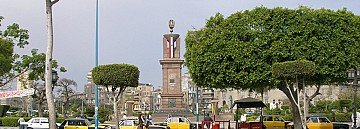The Observatory for the Protection of Human Rights Defenders (FIDH-OMCT), joins 32 human rights organisations calling on the Egyptian government to lift arbitrary travel bans and asset freezes imposed on three directors of the Egyptian Initiative for Personal Rights (EIPR), and to end the targeting of human rights defenders for their legitimate work.
5 December 2024. The Egyptian government must immediately lift the arbitrary travel bans and asset freezes imposed upon three directors of the Egyptian Initiative for Personal Rights (EIPR), a prominent Egyptian human rights organisation, solely for their legitimate human rights work, a coalition of 34 rights groups said today, four years after the men were released from prison following an international outcry at their persecution.
The then EIPR Executive Director Gasser Abdel Razek, Administrative Director Mohamed Bashir, and then Criminal Justice Unit Director Karim Ennarah were arrested between November 15-19, 2020. Following significant domestic and international pressure, the three were released on December 3, 2020 pending investigations in Case No 855/200.
However, upon their release all three men had travel bans imposed on them, preventing them from leaving the country, and on December 6, 2020, their assets were frozen by the Anti-Terrorism Circuit of the Cairo Criminal Court. Since then, four years after the court’s decision, neither they or their lawyers have been allowed to access case documents for Case No. 855/2020, under which they were accused of offences such as joining a terrorist group and spreading false news. The authorities have never produced any evidence for these baseless charges. On December 7, 2020, a group of United Nations (UN) experts stated in relation to the case that, "no human rights defender should face financial restrictions, criminalisation, bail conditions or be imprisoned for their legitimate human rights work."
EIPR has submitted multiple appeals to the courts regarding these punitive measures, including most recently to the Supreme Judicial Council, but, in violation of Egyptian law, have not been granted any court session to challenge them.
In April this year, the Egyptian government closed Case 173 of 2011, the notorious "civil society organisations case", after 13 years, leading to the lifting of travel bans and asset freezes against a number of civil society representatives, including EIPR current executive director Hossam Bahgat. However, as Abdel Razek, Bashir and Ennarah were arrested and prosecuted in a separate case, this decision had no effect on them.
Egypt continues to witness a protracted human rights crisis fuelled by impunity and disregard to rule of law. Egyptian civil society organisations and NGO workers continue to face severe repression from the authorities, including arbitrary detentions and unjust convictions, a restrictive NGO law, and widespread restrictions on their rights to freedom of association, peaceful assembly, and expression. In recent months, authorities have taken steps to amend the Criminal Procedures Law, which the Egyptian authorities are already violating in the ongoing case against the EIPR staff. Egyptian and international human rights groups have raised serious concerns about this draft law further enabling violations of fair trials, and according to several UN special procedures mandate holders, “some of the amendments seem to violate provisions of the Egyptian Constitution and thereby undermine constitutionally protected rights and freedoms.”
In January 2025, Egypt will have its human rights record examined by other governments at the United Nations Human Rights Council in Geneva, in what is known as the Universal Periodic Review (UPR).
The organisations call upon States that will make recommendations to the Egyptian government in a dedicated session on January 28, 2025, to ensure that they use the opportunity to call for the lifting of all travel bans, asset freezes and other punitive measures against human rights defenders, including EIPR’s staff members, and to end the targeting of human rights defenders and human rights organisations solely for their legitimate work.


